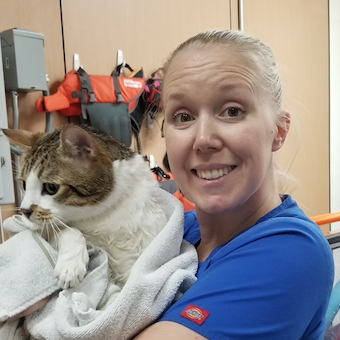Everyone always discusses how important communication with owners is. But, there is much less discussion about how important communication with your veterinary team is.
There is so much more to a veterinary clinic than just veterinarians. Nurses, technicians, assistants, receptionists, and management staff are critical to ensuring that everything runs smoothly — the vet clinic would fall apart with all of them!
Making sure the entire team has a good foundation of communication is imperative.
Overall, there are two broad “categories” of communication:
- when something needs to get done (e.g., a patient needs to get medication at a specific time)
- when you have an issue with something that you think could improve or change.
The latter can be a bit scarier, especially as a new graduate in a new place, where the last thing you want to do is make waves!
The essential thing in these scenarios is the way you communicate. Either way, making sure you liaise well with your team is important for many reasons:
Why Better Communication in Veterinary Practices is Important:
1. Better communication provides patients with exceptional care.
A good, strong communication system with your team during the day ensures:
- medications are given at the correct times
- owners are updated ASAP
- things generally run as best as possible for our furry friends
And, at the end of the day, that’s what it’s all about!
2. Better communication builds rapport within your team.
Speaking with each other and being open about things happening in and out of the hospital means that you get to know your coworkers much better!
Teams that get along work better together.
3. Better communication helps in stressful situations.
This job can be very tough, and effective communication between team members can help.
High-intensity situations, like CPR, can be more stressful by poor communication. Making sure there are clear roles in these scenarios and clear, concise communication means that things run a lot more smoothly.
4. Better communication aids in self-improvement.
Giving and taking constructive criticism means that you can improve in your role and as a person.
For example, after a tough case, it’s good to sit down and discuss:
- what went well
- what you could’ve done better
- what you will do next time something like this happens.
Not only is this good for everyone involved, but also good for our patients. There is nothing wrong with making a mistake, as long as you are prepared to learn from it!
5. Better communication improves issues within the practice.
As mentioned earlier, this can be terrifying, especially as a new graduate! The way you communicate is so important here.
If you have an issue with something, do not be afraid to bring it up. However, be helpful and courteous, not critical, and offer solution ideas to the issue you have.
No workplace is 100% perfect, and that is normal and okay. It is also normal and okay to have opinions on improving things. As long as you communicate your thoughts honestly and politely, this can help improve a workplace in general.
Start prioritizing communication in your practice!
Open communication between team members ensures things flow smoothly in the front and behind the scenes.
If we are all open with each other, there will likely be fewer issues, and we can provide the best care for our patients, all while maintaining excellent inter-work relations!
Want to learn more about creating an awesome practice culture? Read the Ultimate Guide here.




.gif)


